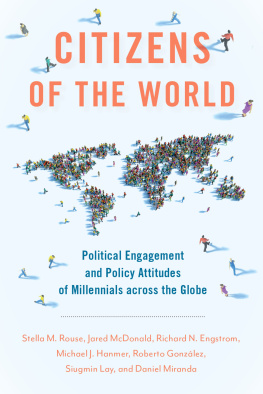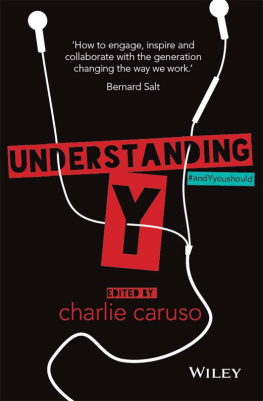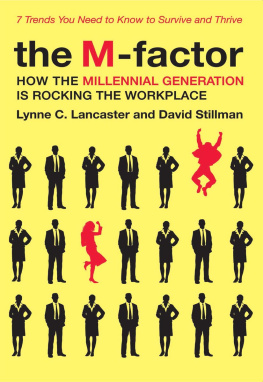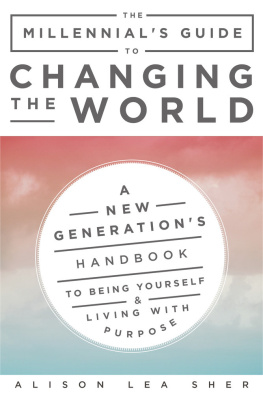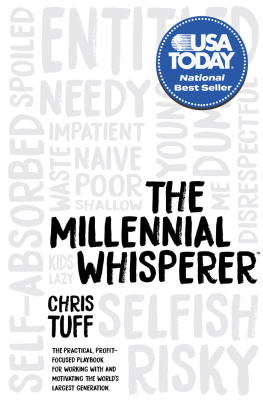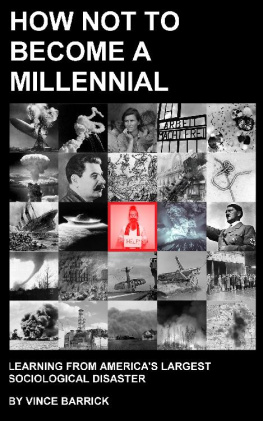Praise for Fast Future
In Fast Future, David Burstein provides a personal and compelling picture of his generation. Millennials are pragmatic idealists and the first digitals, able to handle the fast pace of todays world while they remake our economic and democratic political systems. Read this book not only to understand the future but also how the Millennials are poised to shape it.
MICHAEL D. HAIS and MORLEY WINOGRAD,
authors of Millennial Momentum
We are leaving the young with an unacceptable futureballooning debts, unthinkable tax increases, historically slow growth, an economy vulnerable to crises, and a paralyzed politics. Until now, the involvement of the young has been viewed as a combination of ignorance and apathy. I was delighted to read Fast Future, a book with such a hopeful outlook.
PETE PETERSON, former secretary of
commerce, cofounder, The Blackstone Group
Fast Future is an incisive look at the generation that elected Barack Obama and is changing the way we do everything. David Burstein has written a must-read book about the most individually empowered generation in historyhis own.
HOWARD DEAN, former governor of Vermont
The Millennial Generation is the biggest and most diverse in American history; soon they will run the country. In the great tradition of writers who help define their own generations, David Burstein offers a moving and insightful portrait of Millennial America.
PETER LEVINE, director, CIRCLE (Center
for Information & Research on Civic Learning
& Engagement)
The Millennials are a unique generation with a strong entrepreneurial streak that has seen them create some of the most impactful businesses of this century. As a Millennial entrepreneur, I found Fast Future to be an inspiring and powerful account of the world we live and work in every day.
BEN LERER, founder and CEO, Thrillist
Bursteins generation has already changed the face of politics from Washington to Cairo and beyond. Millennials are distinct and powerful, though scholarship about them has been slapdash and haphazard. Enter David Burstein. With Fast Future, Burstein cements his reputation as the Millennial Generations most thoughtful and insightful public intellectual.
DAVID C. KING, senior lecturer in public
policy, Harvard Kennedy School
Todays young people really are unique. Technology has made them the best-informed generation of young people that the world has ever seen. Their understanding of the problems facing the world has made them the most socially responsible generation ever. And finally their knowledge and understanding of how to use the tools of the digital and social revolution has made them the most powerful generation ever. David Bursteins excellent book tells the story of his own generation: read it and youll know why we should all be listening to them.
DAVID JONES, CEO, Havas Worldwide, cofounder, One Young World
Davids reflections are a fast, fun, informative read.
NANCY LUBLIN, CEO, DoSomething.org
Fast Future speaks to young, social entrepreneurs by telling the story of an exciting turning point that will change the course of history. David Burstein takes a deep and nuanced look at the potential that young people have and the terrible missed opportunity if we dont capitalize on the innovation of the Millennial Generation.
JESSICA POSNER ODEDE and KENNEDY ODEDE, cofounders, Shining Hope for Communities
An inspiring look at what the millennial generation is doing in America Bursteins interviews and firsthand accounts bring to light these young people, and readers will gain a deeper appreciation and awareness of the rapid progress and changes that have occurred worldwide since the advent of the Internet. Stimulating accounts of what is being accomplished by an ambitious generation.
KIRKUS REVIEWS
Fast Future
How the Millennial Generation Is Shaping Our World
David D. Burstein
BEACON PRESS
BOSTON
To my mother and father, the greatest Boomers I know: you raised me with the deepest care and strongest love to be all that I am, instilling in me the best parts of your generations legacy.
To my grandparents Leon, Dorothy, and Joan, members of the Greatest Generation: you came through the hardest of times and helped build our country.
Its a joy to have your love in my life.
And to my generation: you never cease to inspire and excite me. Its a privilege to have the chance to tell our story.
CONTENTS
PREFACE
In the fall of my sophomore year in high school, two friends approached me with an idea. Many of our peers in film class had produced great work, but there was nowhere beyond the classroom where these films could be shown. We had a solution: create a first-of-its-kind film festival exclusively for high school students. It sounded like a fantastic idea, and we couldnt wait to get started. During the next seven months we built a team, raised thousands of dollars, gathered submissions from around the world, secured corporate sponsors, and convinced a local movie theater to donate their venue to us. In May 2004, the first Westport Youth Film Festival took place. We screened sixty films, and hundreds of people flocked to see the work of young filmmakers they did not know. It was a success. And it has lived on: Im happy to say that the festival will celebrate its tenth anniversary this year.
This story illustrates two things that I think are unique about my generation. First, looking back on it, I find it remarkable that not one of my collaborators ever stopped to ask, Can we do this? We never thought, Were just high school kids, we cant put on a film festival. We had no earthly idea how to go about it. But we learned how to do it quite well by bootstrapping, a term from todays entrepreneurial language that we would have used then if we had known it. Just two decades ago, it was unusual for high school students to start their own organizations, businesses, and initiatives. But, as youll see throughout this book, today it has become far more common. The fact that a group of fifteen- and sixteen-year-olds believed we could create a film festival without any prior experience is a true testament to our generations potential.
The second thing that strikes me was the sophistication, quality, and content of the films we screened. Most of the films were thoughtful and dealt with important, relevant themes. We screened films that dealt with gang violence in students neighborhoods, teen suicide, drugs, and education. One student made a documentary about her parents interracial marriage. Even the comedies were smart and original rather than sophomoric. Devoted young filmmakers have been able to create their own work for several decades, but the new affordability and accessibility of film technology and tools have allowed virtually everyone to be a creator, and many are creating meaningful content.
The following November, I invited two dozen friends (many of whom were part of the festival team) over for an election-night party. There was pizza, popcorn, soda, and the self-caricaturing madness that is cable news election coverage. We watched as each set of polls closed and results were projected state by state. All the safe states for Kerry and Bush were called first, putting Kerry at a mathematical Electoral College advantage. It was a school night, so my friends peeled off and left by midnight, even though the outcome was still unclear and the biggest states were yet to be decided. We were all expecting that young people would turn out at the levels so many youth activists had hoped and worked for. But the anchors and pundits declared it another disappointing turnout by young voters.
While I couldnt yet vote, the 2004 election was the first in which I could understand the details of the election and the candidates. I understood the importance of the youth vote. I also knew that young people did not have an impressive record of participation. When the final numbers came in for the 2004 presidential election, youth turnout was actually up 11 percent from 2000. Even so, that meant that just 48 percent of young voters had voted in 2004. Beyond my frustration with turnout levels, and with the media calling a substantial 11 percent increase in turnout another failure of the youth, I was most concerned with the implications: a few hundred thousand more young voters could have changed the course of history. My high school peers and I were active and engaged. We cared about politics and policy. While I knew the same was not universally true of my generationindeed, it wasnt even true for everyone in my schoolI also knew that if we didnt step up, our generations voice would get shut out of the political process. If the crucial connection between our future and our vote could be made clearer, our generation could become a political powerhouse. It was then that I decided to throw myself into what would become a massive effort to turn out young voters in the next presidential election in 2008.
Next page

